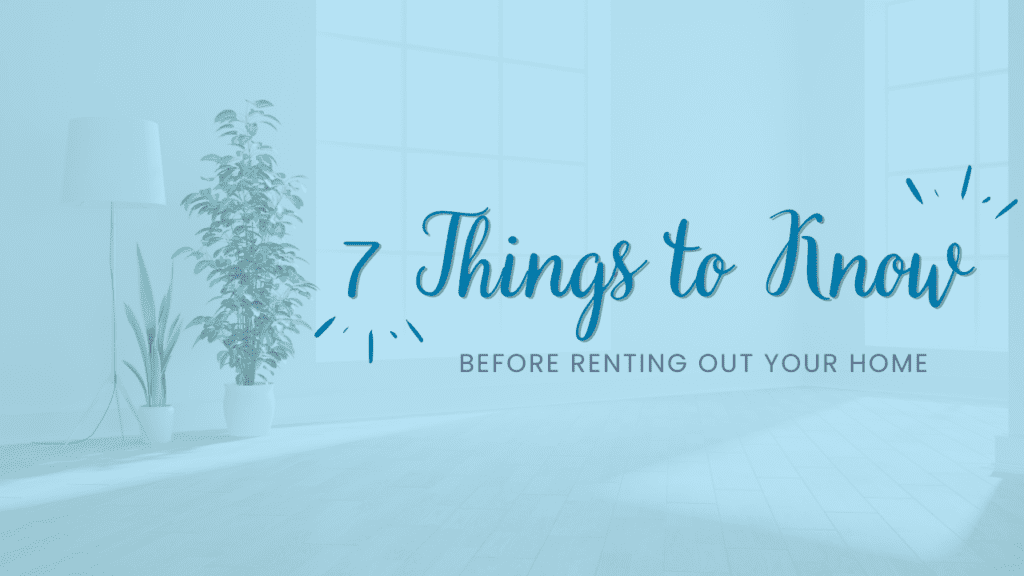
If you’re a landlord or you’re thinking about becoming a landlord, you may have some questions about how you should go about renting out your home.
This is an excellent reason to partner with a local property manager. When you work with a management company to effectively lease, manage, and maintain your home, you don’t have to worry about all the details that come with it.
Maybe you’re not ready for property management, and you’re just looking for a potential starting point.
Before you rent out your home, there are some details and logistics you’ll need to take care of right away. We’re providing a list of seven things you don’t want to forget.
1. Educate Yourself on California Rental Laws
Understanding the legal requirements of renting out a property is critical. You cannot jump into renting out your home without knowing what your lease agreement needs to reflect. You cannot market the property without understanding fair housing laws.
California is one of the strictest states in the country when it comes to tenant protections and rental laws. It’s very easy to make an expensive legal mistake, so protect yourself and prepare yourself before you rent out your home. Here is an overview of what you need to know:
- Rent control laws
- Security deposit requirements
- State and federal fair housing laws
- Section 8 tenants and income standards
- Habitability requirements
- Rent control
- Just cause eviction
A lot of new landlords find themselves unsure about how to handle rental increases against the statewide rent control laws and the local San Diego requirements. Is your property covered by rent control or is it exempt? Your lease agreement has to state whether you’re included or exempt. Your lease also need some specific legal disclosures around lead, asbestos, chemicals, and Megan’s Law.
What about pets? If you’re not allowing pets, that’s fine. However, when is a dog not a pet? When it’s a service animal or a companion animal. The laws are specific but not always easy to understand. When you’re moving a tenant out, you’ll need to know whether you’re looking at damage or normal wear and tear as you make repairs and calculate the security deposit return.
Things can get complicated. Don’t rent out your home without understanding at least the basics of California’s rental laws.
2. Inspect for Necessary Rental Property Repairs
Before you rent out your home, you have to make sure it’s safe and habitable. Everything must work the way it’s meant to. Maybe you have lived for years with that window that always sticks and cannot open properly. It didn’t matter to you, but it will likely matter to your tenants. The standards are higher when you turn your home into a rental property.
You’ll want to start with an inspection. This walk-through can tell you if there are any maintenance issues that will be required to ensure you’re renting out a safe and habitable home. You may find a leak under a sink or a closet door that doesn’t close properly.
Make a list of everything that needs work, including cosmetic issues. Some repairs will be immediate, such as a roof that’s missing shingles or a furnace that’s slow to provide heat. Minor repairs such as window screens and air filters and new light bulbs can wait until you’re ready to move a tenant in. But, you want to make sure there aren’t any major repairs that will need to be made before the property is ready for the rental market.
Be detailed and thorough as you inspect the system and functions of your home:
- Test every outlet. Make sure they work and be sure there aren’t sparks or smoke.
- Turn on every faucet. Check under sinks and behind toilets for potential drips or moist areas.
- Run the appliances and decide whether they need to be replaced.
- Are the floors clean? You may need new carpet or a refinishing on wood floors.
- Evaluate your landscaping. Is it clean and attractive and low-maintenance? Decide how you will maintain it; will you expect your tenants to do it, or will you hire a company?
Once you are satisfied that you know what needs to be done, make sure you have a reliable list of vendors and contractors who can help you. These relationships will be critical throughout the term of your lease agreement when you need help responding to routine and emergency repairs.
3. Look for Opportunities to Improve your San Diego Rental
It’s not just that everything is working.
You also want everything in your home to be modern, attractive, and up to date. Tenants won’t want to move into a home that still has wood paneling from the 1970s. They won’t want peeling paint on the ceilings. Improvements and renovations will require an initial investment but you’ll find it’s better for you once you list your home. Making upgrades and updates to your property will help you earn more rent. You’ll also find good tenants faster, which will also help you increase what you earn.
There’s no need to renovate the entire home if it’s in good shape. There’s no need to add on a room or install a spa bathroom. Simply make some small improvements, such as new paint or fresh landscaping. Install tile backsplash in the kitchen or update your floors to hard surfaces. These details get the attention of your future tenants.
4. Clean and Prepare for Tenants
You’ll have a hard time finding tenants if the property isn’t clean.
When you’re preparing to rent out your home, have it professionally cleaned. A professional will do a deep clean, attending to details you might not even have thought about. They’ll dust baseboards and sweep behind appliances. A very clean home is a move-in ready home, and tenants will notice.
The cleaning is necessary at several points. You’ll want to clean it out thoroughly before you begin showing the property. If you’ve had vendors and contractors coming through the home to make repairs, a mess was likely left behind. You’ll want to scrub away handprints and footprints on walls and floors.
It’s possible you’ll need to clean again before your tenants move in, especially if you were busy during the showing period and had a lot of foot traffic.
5. Price Your Rental Property Accurately
Deciding on a rental price is another critical activity that you’ll have to tackle before you rent out your home. How much will you charge?
You might have an idea of what you want to earn, but the San Diego rental market really drives what you can ask for in rent. Pay attention to what similar properties are renting for in your area. Don’t price your home too high, or you’ll face a longer vacancy. Don’t price it too low or you’ll lose money before you even collect your first rent check.
It’s important that you access good data before you list your property for rent. You can check sites like Zillow and Zumper to see what other homes are listed for, but the nuance of your location can make a big difference. Many local property managers will conduct a free rental analysis for you. This can provide a great starting point, and you’ll know that the rental range is coming from data that’s gathered on a daily basis, by professional property managers.
A price that’s too low will leave you playing catch-up. A price that’s too high will only extend your vacancy, which is expensive.
6. Put Together a Marketing Plan
Finally, put together a marketing plan. Take some great marketing photos, which are especially important. Your prospective residents are likely to look at the photos first; they’ll read the description after they’ve decided that they like how your property looks. So, invest in good photos.
Write an engaging description that’s informative but concise. Tenants looking for new homes aren’t going to read paragraphs of text. Lay out some bullet points and include information that they’ll need to contact you and schedule a showing.
Use online rental sites and syndicate your listing if you can. Use social media, as well.
7. Partner with a San Diego Property Manager
Finally, don’t do everything yourself. You’ll find that you can waste a lot of time and money making mistakes that a management company could have prevented.
Professional property management in San Diego is crucial, especially if you’ve never rented out a home before. Your management partner will help you limit the risk that comes with renting out a property. You won’t have to worry about staying ahead of the latest laws, finding a vendor when you need repairs, or collecting rent from tenants. Your property manager is an expert, and you’ll have a much better rental experience if you turn it over to someone who has done this for years.
 We can help you with each of these steps and prepare you for a profitable, stress-free rental experience. Contact us at Chase Pacific Property Management & Real Estate Services before you decide to rent out your home.
We can help you with each of these steps and prepare you for a profitable, stress-free rental experience. Contact us at Chase Pacific Property Management & Real Estate Services before you decide to rent out your home.
